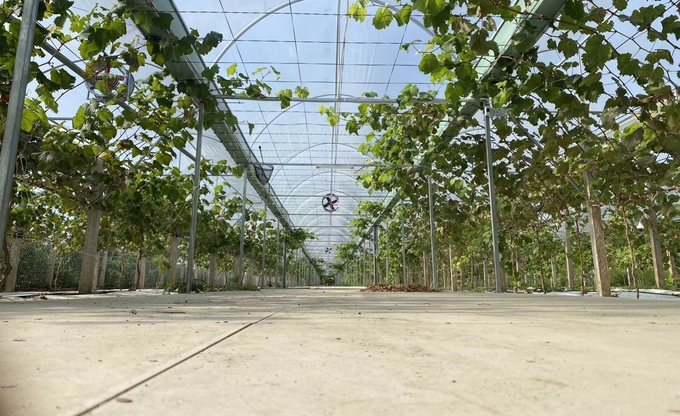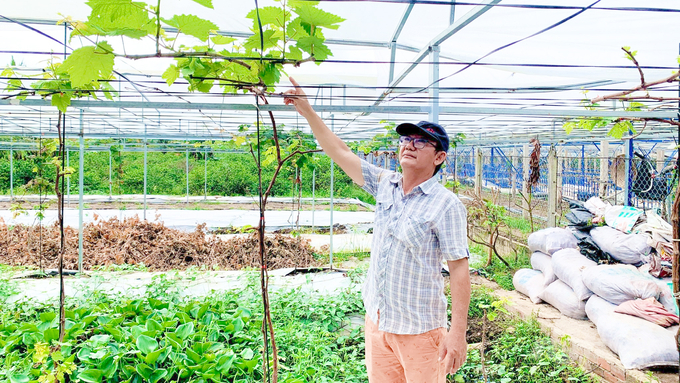
The more than 5,000 square meter vineyard in Mr. Duy’s greenhouse is preparing to bear fruit. Photo: Ho Thao.
Invest billions to fulfill your passion
According to Mr Duy, before he returned to his hometown to settle in Binh Thuy district of Can Tho city, he lived in Ho Chi Minh City and had a motorcycle trading establishment. During the time when his family was isolated from the Covid-19 epidemic, the longing for his homeland was more intense than ever. From then on, the old farmer intended to return to his hometown to live and build his own farm.
“The criteria I have set myself is to plant a tree that is both unique and has few people to cultivate and, above all, has high economic value. I’ve researched local and international farming websites, cherry blossoms, I was convinced,” shared Mr Duy.
He spent many days documenting all documents related to Japanese viticulture, from soil preparation to pruning techniques to tree care. After learning the basics, Mr. Duy passed the business on to his relatives to manage to return to his hometown and become a real farmer.
In 2021, Mr. Duy invested billions of Dong to buy land and started planting a vineyard of more than 5,000m2 in his hometown of Binh Thuy. At that time, many people in the neighborhood were talking about him, some even thought he was crazy. Mr. Duy’s cultivation of foreign grape varieties is a myth, because the natural conditions in Vietnam are far removed from those in Japan.
“This year I ordered seedlings from Korea to send back at the price of VND 500,000 per tree, which is several times more expensive than Ninh Thuan grapes from Vietnam. Also, the special medicines for the vine, which cost several million dongs/pack, can be really passionate and withstand the public pressure,” Mr. Duy said.
Indeed, passion is not enough. The first grape harvest due to lack of practical experience, plus the western weather, it rained a lot, so Mr. Duy’s vineyard had a big problem. Powdery mildew, anthracnose makes the vineyard lose almost all.
Failure did not discourage him, but made him more determined to conquer that tree. Realizing that environmental factors determine 70% of grapevine growing process, Mr. Duy spent more money to invest in more greenhouse systems and import roofs from abroad for more than 1 million VND/m2. Add to that an automatic sprinkler system and a dehumidifying fan in the garden that quite surprises everyone around them.
After Mr. Duy first learned, he sprinkled lime powder on the soil before sowing and dried the soil for 6 months to check bacteria and fungi. Each Can Tho mature farmer’s tree is planted 3m apart, with branches cut every 6 months to create a canopy for the tree.
“The vine is three years old or older, gives two harvests per year, the life expectancy of peony bunches is about 10 years, the wine growers have an initial investment of 300 million/1,000 square meters. However, the price of grapes in the market ranges from a few hundred thousand to a million dong/kg, so I can rest assured that I will make profits soon,” said Duy.

Mr. Duy is the rare owner of the largest Japanese peony vineyard in Can Tho. Photo: Ho Thao.
Spread the community
Mr. Duy’s vineyard is currently green and ready for the second off-season. The old farmer said he was willing to share his experience with his people if he intended to start a business with this foreign grape variety.
Mr. Nguyen Van Mui (Mr. Duy’s neighbor) shared: “Mr. Duy was the first to successfully grow Japanese grapes locally. This also made Mr Duy a good example of agricultural production that we could learn from. This year I will go to Mr. Duy’s house, first to wish Tet, then to learn more about Japanese grape varieties to introduce to relatives who intend to develop this plant.”
According to Mr Duy, his first and largest peony winery in Can Tho will be officially opened in 2023 to welcome visitors. This will contribute to the diversification of agricultural products and the development of local tourism, and promote Can Tho City’s image among tourists from near and far.
Peony is a diploid cultivar, the result of a cross between the Akitsu-21 and Hakunan (V. vinifera) cultivars created by the National Institute of Fruit Science (NIFTS) Japan in 1988, has large, greenish-yellow berries, fleshy texture, Aroma, high concentration of soluble solids and low acidity. Currently in Vietnam, farmers growing this grape are limited due to natural factors as well as high investment costs.

